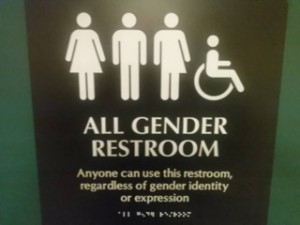“Progressive” Gender Blindness: A Solution Desperately Seeking Problems to Worsen
September 23rd, 2014 by Nicole
Wesleyan University is, if you’re of a particular ideological persuasion, a cutting-edge campus. It’s where this reportedly lives:
(Note: I haven’t personally verified this photo, but I believe the source.)
Now, in the wake of what looks like an out-of-control situation with fraternities and sexual assault, Wesleyan’s decision is — get this — to force coed integration upon their residences. Presumably, a young, drunken womanizer’s target, who once had to be lured with the promise of fun and social acceptance, will now have sleeping quarters down the hall.
Does this seem…ahem…bass-ackward to anybody else? At least a half dozen sarcastic quips making use of the phrase “easy access” come quickly to mind. Also, the subplot from National Lampoon’s Animal House in which Otter exploits a young woman’s death to get into the fictitious Emily Dickinson College to seduce her friends? Obsolete. Quaint, even.
This isn’t a joking matter, though. Unfortunately it’s very serious. If you thought the Bathroom Bill was a safety issue, call this change in campus policy the Bathroom Bill on steroids. In The Hartford Courant’s article, one finds quotes like this which are near-inexplicable in the light of common sense:
The move to co-education is really all about inclusion. It’s all about equity and very much in keeping with Wesleyan’s tradition of equity and progressive leadership on gender equity and issues like this. [Kate Carlisle, Wesleyan spokeswoman]
A really good way to facilitate not committing ourselves to gender roles is to create these shared spaces. [Denisse Reyes, senior]
Is this an indication of the kind of education students receive at Wesleyan, or the kind of students and professionals attracted to Wesleyan? Or both? Either way, would it increase your confidence in sending your children there?
Once upon a time, I lived on a coed floor of a dormitory. I remember the awkwardness when I headed out one morning in my bathrobe and encountered a male janitor cleaning the women’s showers (again, it seems almost quaint today), which basically anyone in the building could walk into. Our RA would claim based on anecdotal evidence that our floor — which happened to be populated by a number of serious musicians with little time or patience for shenanigans — was better behaved than many of the single-sex floors. Actual research does not back up that assertion, finding instead that students in coed dorms are more likely to binge drink, have multiple sexual partners, and use porn. Also mentioned are the fact that a whopping 90% of dorms in the U.S. are coed and, astonishingly, colleges expect the student to opt out. This came as a shock to Karin Morin and her daughter, then a student at Stanford, who was unknowingly placed in a room assignment that included two unfamiliar men and ended up dressing herself in the bathroom for privacy’s sake.
Getting back to Wesleyan, some fraternity members appear to have possibly legitimate concerns that the break from their traditional mission will cause their national charters to be revoked and the innocent to be punished with the guilty. Would I volunteer to be one of the first women to enter into an environment where the university has set me up to be an obvious scapegoat for resentment that might arise over this? Who would be more likely to suffer the brunt of such resentment: the distant, somewhat intimidating university administration, or the vulnerable person who’s suddenly in close quarters all the time? I think I’d pass.
Furthermore, are male students not being provided with enough other academic and social opportunities to learn that women are human beings and deserve to be treated accordingly (and vice-versa)? Whose fault is that in the end; where does that buck stop? Can men and women be trusted to do anything — anything — separately, much less together?
This is all kinds of messed-up, and I hope the whole Wesleyan community comes to its senses.



Wesleyan U. is a private institution. If students do not agree to the residence hall policies, they have every right to drop out or not attend in the first place. That’s part of the Constitution’s guarantee of the right of free association. Let’s see what problems may actually come up after a year or so. Nicole can follow up next September based on how the policy is working out. It ‘s like gay marriage. Many condemned it before it began in this country 10 years ago and is now legal in 30-some states. Now that it’s been around for several years, let’d see some stories of actual harm it’s done.